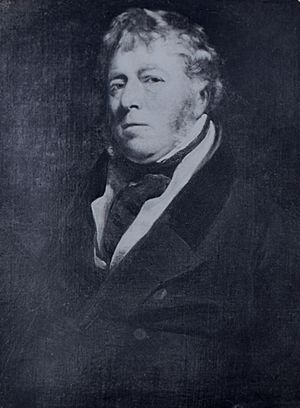Bertie Greatheed facts for kids
Bertie Greatheed (1759–1826) was an English writer and landowner. He was also involved in owning enslaved people.
Contents
Life of Bertie Greatheed
Bertie Greatheed was born on October 19, 1759. His father was Samuel Greatheed, a Member of Parliament (MP). His mother was Lady Mary Bertie.
After his parents passed away, Bertie inherited important properties. He received the Guy's Cliffe Estate near Warwick. He also inherited a plantation in the Caribbean island of St Kitts. This plantation was near Basseterre, the capital city. He also got land in Lincolnshire from his mother's family.
Early in his life, most of Bertie's money came from the St Kitts plantation. He also earned some money from his land in Warwick. He used his wealth to help develop Leamington Priors. This town later became known as Leamington Spa. It was a popular place for people to visit for health and relaxation. Bertie owned building plots along what is now the Parade. He was also a partner in the Royal Pump Rooms, a famous building in Leamington.
The St Kitts Plantation and Slavery
The plantation in St Kitts was called Canaries. It was managed by family members for Bertie Greatheed. In the early 1780s, the plantation had over 230 enslaved people. These people were forced to work there. In 1788, the plantation made about £380 in profit.
Bertie Greatheed's letters about the plantation are kept in the Warwickshire County Record Office. These letters show details about the trade of enslaved people. They also describe the production of sugar and rum. Bertie Greatheed said he supported the end of slavery. He even called the plantation his "odious property," meaning he hated owning it. However, he continued to own enslaved people during his lifetime.
After slavery was officially ended in 1833 by the Slavery Abolition Act 1833, his family received money. In 1835, his descendants, including his granddaughter's husband, received £1,223 6s 7d as compensation. This money was given to former slave owners.
Bertie Greatheed's Family
In 1780, Bertie Greatheed married his cousin, Ann Greatheed. She was born in St Kitts. They had one son, also named Bertie, who was born in 1781.
The Greatheed family traveled a lot around Europe. They lived in Germany, France, and Italy. In 1803, they were held as prisoners of war in Paris. Many other British families were also detained there. Young Bertie Greatheed was becoming a talented artist. He painted a picture of Napoleon Bonaparte. Napoleon's family liked the painting, which might have helped the Greatheeds get better treatment.
Sadly, while staying in Vicenza, Italy, his son died suddenly. He passed away from influenza on October 8, 1804, at age 23. Soon after his son's death, it was found that he had a daughter named Ann Caroline. She was born to a woman in Dresden. Ann Caroline was brought to England by her grandparents and raised at Guy's Cliffe. She later married Lord Charles Greatheed Bertie Percy in 1823.
Bertie Greatheed's Writings
When Bertie Greatheed lived in Florence, Italy, he joined a group called Gli Oziosi. He wrote for their private collections of writings. These included the Arno Miscellany (1784) and the Florence Miscellany (1785). The Florence Miscellany was a collection of poems by a group called the Della-Cruscans.
Bertie Greatheed wrote a play called The Regent. It was a serious play written in blank verse. The play was performed at the Drury Lane Theatre on April 1, 1788. Famous actors like John Kemble and Sarah Siddons were in it. The play ran for nine nights.
One reviewer said that the story of the play was interesting. However, a scene with a child in it was very upsetting to the audience. The audience strongly showed their disapproval. Bertie Greatheed later published the play. He dedicated it to Mrs. Siddons, who had been a guest at his home, Guy's Cliffe.
 | Claudette Colvin |
 | Myrlie Evers-Williams |
 | Alberta Odell Jones |


